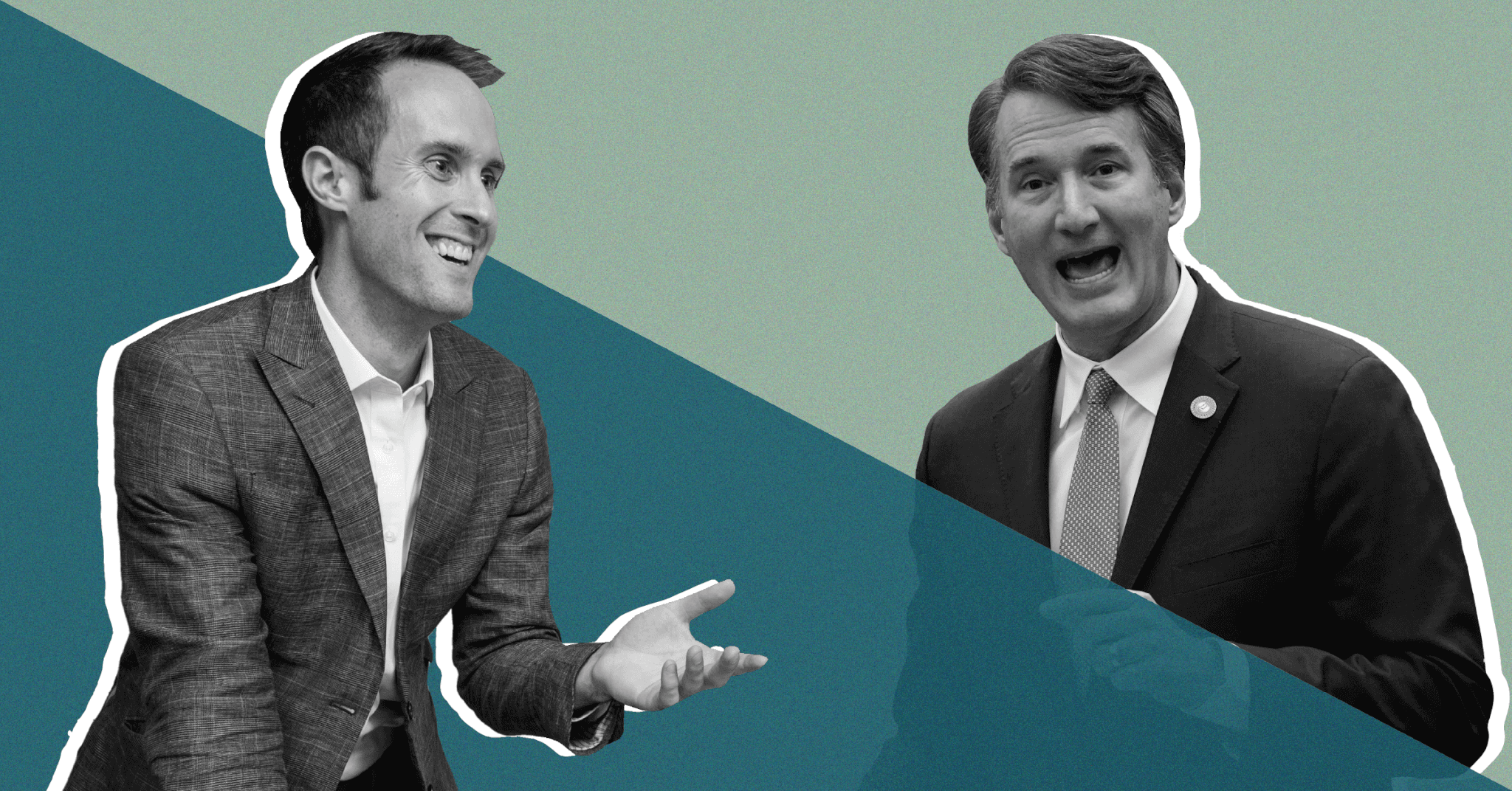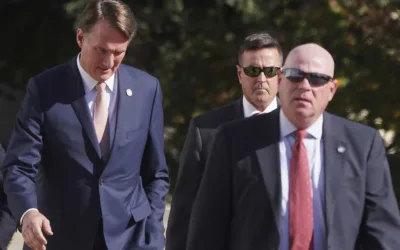
Education is a hot topic in the commonwealth, so Dogwood sat down with Del. Schuyler VanValkenburg to discuss the issue–not just from a legislator’s perspective, but from an actual teacher’s point of view.
Education was a big focus for Virginia’s lawmakers this year, and not just because of the Youngkin administration’s $201 million school funding gap (that still isn’t fully resolved) and the abrupt, unexplained resignation of Gov. Glenn Youngkin’s Superintendent of Public Instruction.
Dogwood recently chatted with Del. Schuyler VanValkenburg, who’s an actual teacher, to get his take on the status of education in Virginia.
When he’s not representing his district in the Virginia General Assembly, VanValkenburg teaches government classes to seniors in Henrico County. Over his 18 years experience as an educator, he’s taught a variety of government and history classes to eighth graders through twelfth graders.
“Since the governor’s election, you’ve seen a rise in an extreme right-wing agenda; whether that’s vouchers which defund public schools, lowers student outcomes, or attacks on history curriculum or students because of who they are,” he noted.
VanValkenburg is hopeful that the current divide among lawmakers is “just a blip” and that they’ll be able to come together to work through the issues that divide them.
He also said that Gov. Youngkin’s leadership on education is an example of “missed opportunities.”
“There’s been bipartisan consensus around really rolling up our sleeves and getting to work and trying to do right by our kids. I think you’ve seen a whole bunch of missed opportunities on that, where he could have worked with Democrats and Republicans or other stakeholders to try and improve accreditation or to continue tweaking the history standards. They weren’t done when he came into office.”
He noted that the Youngkin administration has been using a “go at it” approach, where things were done secretly that resulted in mistakes or errors, or have “done things that are really quite right-wing and out of touch with Virginians.”
“Rather than coming in to govern and bring people together to continue the work we’ve been doing, they decided to strike it on their own, with policies that have shown to be really unpopular in Virginia,” VanValkenburg lamented.
A lot of Youngkin’s tenure thus far has been based on policies that have been unpopular and led to many debates, including ones on transgender students, the history standards, and even Executive Order One, which sought to inject the manufactured controversy around critical race theory–which is not and has never been taught in Virginia’s public K-12 schools–into state education policy.
“I think it’s been kind of repeatedly ginning up that kind of fake outrage or attacking a minority of people, versus trying to actually do the work of making our schools better. I think it’s telling that, when the [Youngkin’s] Superintendent [of Public Instruction] resigned, she really couldn’t point to any achievement for the administration.”
In fact, despite the popularity and success of the Virginia Literacy Act, the Youngkin administration didn’t fully fund it in the proposed budget for this year. VanValkenburg noted that there were people who were willing to work with the administration to try and continue the progress that had been made in the previous four years.
“It speaks to a very partisan administration.”
Positive Changes Afoot
VanValkenburg believes a big education win in this year’s General Assembly session was the expansion of the bipartisan Virginia Literacy Act beyond students in kindergarten through third grade, adding fourth through eighth graders to the program. The legislation is currently awaiting Gov. Glenn Youngkin’s signature.
“Literacy rates have been going down not just in Virginia, but across the country. We’ve needed to fix how we teach reading for a while, and that’s probably the biggest ticket issue that passed.”
VanValkenburg also weighed in on Virginia’s teacher shortage. While teachers are certainly concerned about pay, they are also frustrated by increasing administrative obligations that take time away from teaching students in classrooms.
“One of things that we know is that one of the big reasons that teachers leave the profession is actually the workforce environment,” he said.
When it comes to the as-yet-unresolved state budget adjustments and their impact on public education in the commonwealth, VanValkenburg is optimistic, calling the amendments proposed by the Democratic-majority state Senate “possibly a game changer for public education.”
“This year, the most important thing we do…if we adopt the Senate Democratic budget, or most of the Senate Democratic budget, we’ll finally have gotten to a place where we were 12 years ago and finally getting back to the funding where we were at prior to the Great Recession … and be in a place where we’re aggressively getting closer and closer to the national average for teacher salaries and continue to put money into the schools that need it the most,” VanValkenburg told us.
Youngkin’s proposed budget focuses more on tax cuts for corporations and the wealthy, as opposed to funding education in the state.
“I think we need to get back to where we were under the [former Gov. Ralph] Northam administration, where we had bipartisan agreement on upping our investments in public education,” VanValkenburg continued. “We had bipartisan successes on policies that are going to help kids, whether it was expanding Pre-K, the G3 [community college scholarship] program, … starting the [Virginia] Literacy Act, and starting to think about these ways that we can have better classroom instruction starting to get the ball rolling on testing reform, and better testing in schools.”
VanValkenburg made it a point to note that adopting policies to help maximize student outcomes and make sure that Virginia’s students are getting a world-class education should be the commonwealth’s highest priorities.
Combined with inflammatory rhetoric in regards to Youngkin’s divisive executive orders and policies around transgender students, the lawmaker’s disappointment in the current gubernatorial administration’s priorities is clear.
“I think what’s really disappointing about this year is that for the first time since I’ve been here, we had a proposed budget that didn’t really do anything for public education. It did not continue to invest [in schools], expanding pre-k, it did not give the support staff cap, it did not continue our trend of increasing teacher pay, it did not invest in high needs schools, and it did not invest in school construction.
Moving forward, VanValkenburg wants to see a return to the bipartisan agreements around policies that help communities prosper and make public education great: “It’s what drives families and businesses to Virginia.”
He hopes that over the next year and beyond, Virginia will be in a place where lawmakers can focus on issues that really matter to Virginia’s schools, instead of fixating on divisive cultural issues or trying to defund public schools
Teachers are human, VanValkenburg noted, and they’ve seen how things have been playing out not just in Virginia, but across the country. He explained that educators have noticed the effects of extreme legislation being passed in states like Florida and Tennessee, and he believes they are right to be worried about what comes next in the commonwealth, because what they teach could be weaponized by politicians or policymakers.
“I do think we’re in a time period where teachers are nervous about these things, and nervous about where the discourse is and whether politicians and leaders are going to have their back. I think that’s unfortunate,” he continued. “I think ultimately [that] American history is a history we can be proud of; we have our mistakes, we have our tragedies. But if you look at the broad course of American history, our Constitution and our values have allowed us to overcome a lot of those and give us the tools to overcome it. It’s an empowering history.”
VanValkenburg explained that, while Virginia hasn’t seen extreme anti-education legislation passed akin to new laws in states like Florida and Tennessee, Democrats are the only thing standing in the way of that.
“At the end of the day, these types of legislation haven’t passed in Virginia because we’ve been able to have a Democratic majority in the Senate, and in a couple cases, we’ve been able to stop it even in the Republican-led House. We’ve been able to stop legislation that would go the route of Florida or Tennessee.”
VanValkenburg wants people to know that Virginia’s legislature ultimately understands what needs to be done to improve schools in the commonwealth. Schools have been underfunded since the Great Recession, and support staff, counselors, or even resources just aren’t there to help properly educate every child. But ultimately he believes that, if legislators work together, they can get things done to make education policies better for everyone in the commonwealth.

Here’s everything you need to know about this month’s Mercury retrograde
Does everything in your life feel a little more chaotic than usual? Or do you feel like misunderstandings are cropping up more frequently than they...

VIDEO: Check out Dogwood’s new merch line
Big news, Virginia! We've officially launched our Dogwood merch line 🎉 This year, we celebrate 5 years of bringing you Virginia news you can use....

VIDEO: Your support matters!
Your support matters! Donate today. @vadogwoodnews Your support matters! Visit our link in bio to donate today. #virginianews #virginia #community...

Op-Ed: Virginia’s new Democratic majorities pass key bills to improve your lives, but will Youngkin sign them?
The 2024 Virginia General Assembly regular session has wrapped up. It was a peculiar session from the outset, with Democratic majorities in the...

From the state rock to the state flower, here’s how Virginia got its symbols
Have you ever wondered why the Dogwood is the state flower? Or how the cardinal became the state bird? We’re here to answer those questions and more...

VIDEO: Second-gentleman Douglas Emhoff gives speech on reproductive freedom
Second gentleman, Douglas Emhoff touched on reproductive freedom not only being a woman's issue but "an everyone's issue" during the Biden-Harris...





